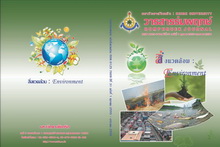เงื่อนไขและผลของการปลูกพืชเพื่อรายได้กับระบบนิเวศที่สมดุล : กรณีศึกษาการปลูกลิ้นจี่กับพืชผักของชุมชนม้งบ้านแม่สาใหม่-แม่สาน้อย ตำบลโป่งแยง อำ เภอแม่ริม จังหวัดเชียงใหม่
Main Article Content
Abstract
ผลการวิจัยพบว่า 1) เงื่อนไขที่ส่งผลต่อการตัดสินใจเลือกคงสวนลิ้นจี่ไว้ หรือตัดลิ้นจี่แล้วปลูกผักแทนของกลุ่มเกษตรกรตัวอย่าง ประกอบด้วย 3 เงื่อนไข ดังนี้เกษตรกรกลุ่มที่สามารถเข้าถึงแหล่งทรัพยากรธรรมชาติที่เป็นต้นทุนการผลิตที่ดีกว่า (เงื่อนไขทางนิเวศ) มีแหล่งรายได้เพื่อดำรงชีพที่หลากหลายกว่า (เงื่อนไขทางเศรษฐกิจ) และการมีสิทธิในการถือครองที่ดินที่มากกว่า (เงื่อนไขเชิงพื้นที่ ทำกิน) เกษตรกรกลุ่มนี้เลือกคงสวนลิ้นจี่ไว้ ขณะที่เกษตรกรอีกกลุ่มที่มีเงื่อนไขเหล่านี้อยู่ในสถานะที่จำกัดกว่า เลือกตัดลิ้นจี่แล้วปลูกผักแทน 2) ครัวเรือนตัวอย่างทั้งสองกลุ่มมีรายได้สุทธิติดลบสูงขึ้นจากการผลิตลิ้นจี่ ในขณะที่รายได้สุทธิจากการปลูกผักเพิ่มขึ้นเมื่อเปรียบเทียบกับรายได้จากการผลิตทั้งสองระบบเมื่อ 5 ปีที่ผ่านมา 3) จากการสุ่มเก็บตัวอย่างดิน และพรรณวัชพืชในแปลงของทั้งสองระบบการผลิต พบว่า ความอุดมสมบูรณ์ของดินทั้งสองระบบการผลิตไม่มีความแตกต่างกัน ซึ่งอยู่ในระดับปานกลาง
ความหลากหลายของชนิดพรรณวัชพืชในแปลงสวนลิ้นจี่ มีมากกว่าในแปลงสวนผัก มีความแตกต่างกันทั้งชนิดและปริมาณ แม้ผลกระทบทางระบบนิเวศในพื้นที่สวนลิ้นจี่มีแนวโน้มดีกว่า เมื่อเปรียบเทียบกับระบบการปลูกพืชผักอายุสั้น อย่างไรก็ตามผลตอบแทนทางเศรษฐกิจที่สูงกว่าจากการปลูกพืชผักอายุสั้นส่งผลให้เกษตรกรตัวอย่าง 20 ราย ที่คำนึงถึงความอยู่รอดทางด้านเศรษฐกิจครัวเรือน เลือกตัดต้นลิ้นจี่แล้วปลูกผักแทน ขณะที่เกษตรกรครัวเรือนตัวอย่างอีก 20 ราย ที่มีเงื่อนไขในการผลิตที่ดีกว่า เลือกคงสวนลิ้นจี่ไว้เพื่อใช้เป็นกลยุทธ์ในการต่อรองสิทธิ์ในการใช้ที่ดินและรักษาความมั่นคงในการถือครองที่ดิน โดยไม่มีเงื่อนไขใดเงื่อนไขหนึ่งที่สามารถส่งผลต่อทางเลือกอย่างเบ็ดเสร็จสมบูรณ์ แต่เป็นหลายๆ เงื่อนไขรวมกัน
The Conditions and Consequences of Cash Crops Cultivation and Balance of Ecosystem: A Case Study of Lychee and Vegetables Cultivation in Hmong Communities, Ban Mae Sa Mai - Mae Sa Noi, Pong Yang Sub-district, Mae Rim District, Chiang Mai Province
The objectives of this research aim to examine in what conditions influenced farmer’s decision on lychee or vegetable production, and to compare economical cash returns and ecological impacts between lychee and vegetables production. Stratified sampling was employed; two groups of farmers were interviewed. The first group was farmers who decided to maintain lychee production after incidented of price fluctuation (lychee group), the second group was farmers who changed their major crop from lychee to vegetables after the incidented (vegetable group). Each group contains 20 households representative. Data analysis employed both quantitative and qualitative method; data collection combines the use of designed questionnaire, focus group discussion, participatory and non-participatory observations. To study ecological impacts through lychee orchard and vegetables production plots, soil sampling and weed inventory sampling were studied.
The results of this research were found that 1) the conditions influence farmer’s decision on maintain their lychee production or cut down their lychee trees and convert to vegetables cultivation consist of 3 conditions. (1) ecological condition, (2) economical condition, and (3) land use condition. The group of farmers who better equipped with these three conditions, decided to maintain their lychee production, whereas the other group of farmers who received limit advantages limited on these three conditions, decided to cut down their lychee trees and converted to vegetables cultivation. 2) The economical cash income from lychee and vegetables production. Both lychee and vegetables farmer groups earned higher minus net income from lychee production, whereas vegetables cultivation earned higher net income compared to net income from these two production system in the last five year. 3) The result of soil and weed studied from both production systems, the studied found that the soil fertilities were not difference, being moderately fertile. This suggest, moreover, according to the studies of species diversity of weeds between lychee orchard and vegetables plot, there were found that differences in both of type and quantity of species.
Even though, the consequence from lychee production impacts on ecology was less than vegetables cultivation in comparison. However, more economical cash returns from vegetables cultivation impacts on 20 household representatives, who were concerned about their households economic survival, this group of people decided to cut down their lychee trees and converted to vegetables cultivation. Whereas, the other 20 household representatives have better conditions for production, they decided to maintain their lychee production, in order to use as a strategy to negotiate the rights on land use and maintain their land tenure security. From all conditions influencing both groups of farmer’s decision on their livelihood survival adaptation, it was found that there was no individual condition that could absolutely influence farmer’s decision. In contrast, they were integrated of multiple conditions.
Article Details
Every article published in the Romphruek Journal of the Humanities and Social Sciences is the opinion and point of view of the authors. Thery're not the viewpoint of Krirk University or the editored department. Any part or all of the articles for pablication must be clearly cited.


